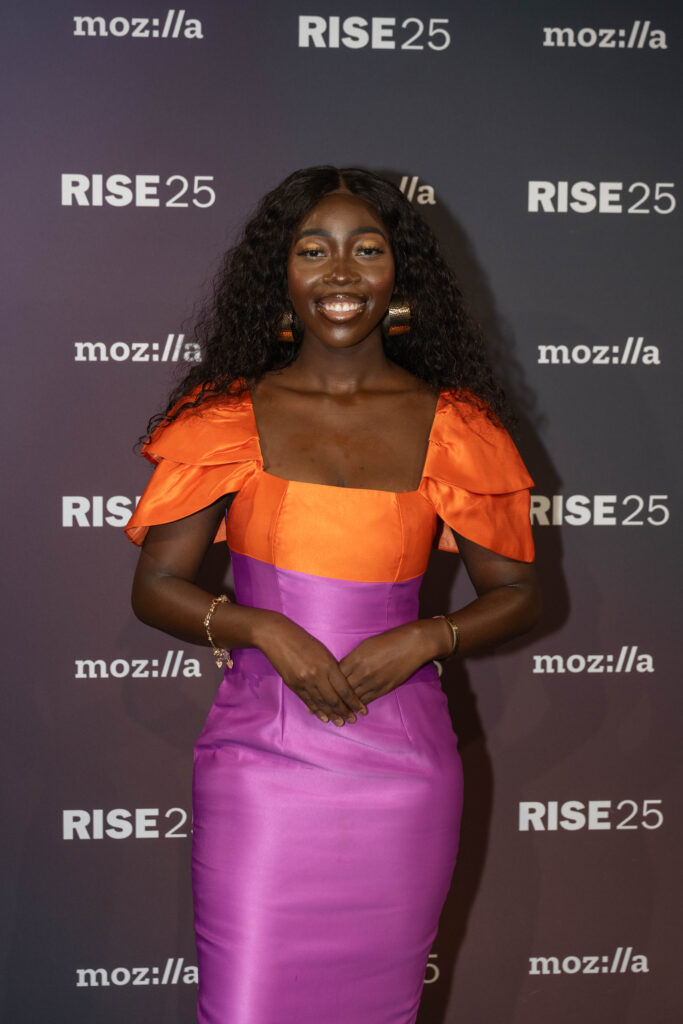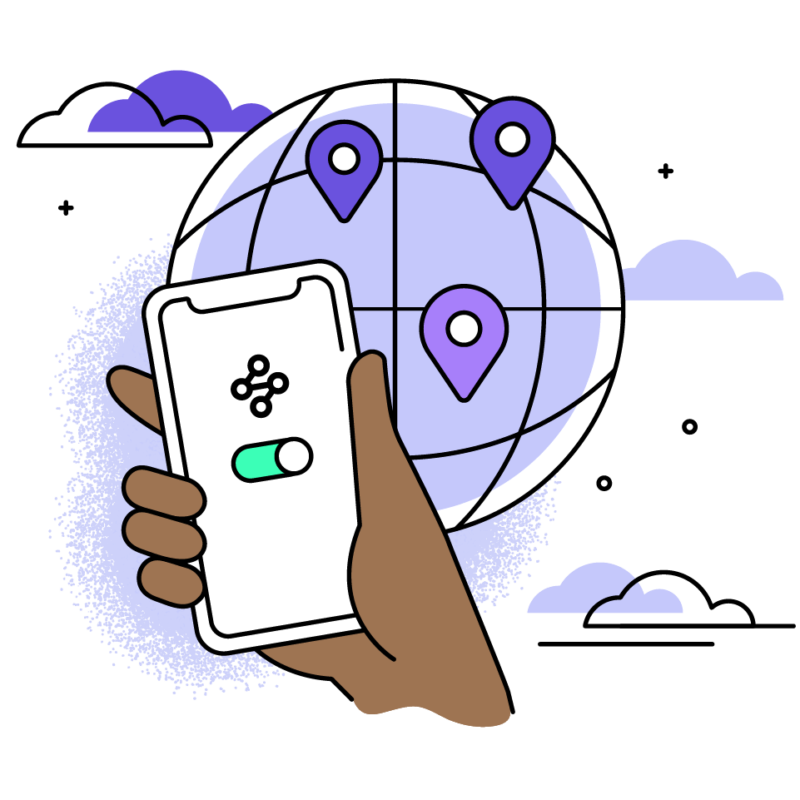Creator Nyamekye Wilson is uplifting Black women in STEM and creating a talent pipeline for the next generation
At Mozilla, we know we can't create a better future alone, that is why each year we will be highlighting the work of 25 digital leaders using technology to amplify voices, effect change, and build new technologies globally through ourRise 25 Awards.These storytellers, innovators, activists, advocates. builders and artists are helping make the internet more diverse, ethical, responsible and inclusive.
This week, we chatted with Nyamekye Wilson, a creator that is the founder and CEO of Black Sisters in STEM, a group building one of the largest talent pipelines of Black college women in STEM. Her passion for global STEM and bridging the gender gap gave birth to a six-figure tech company while she was working at Google. We talk with Nyamekye about the challenges she's faced in her career, starting a Black nonprofit, where she draws inspiration from and more.
OK, first off, where did the phrase the Moses of STEM" originate from for you?
It came to me at church, and it was something that I just knew and I just heard and my brain is like the Moses of them." And then it was something that I spoke over to the team like a fellow - like that is really perfect, that's exactly who you are.
The historical figure of Moses, he was someone who led people out of activity. And so really with Black Sisters in STEM, it's not just a workplace organization, it's so much more than that. It is really that we are taking Black women out of a lot of the activity that they've learned over time from a very young age of things that we cannot be, things that we cannot do, places we cannot go. Who we cannot be. And so, when it comes to the Moses of STEM, it's really about unearthing and bringing people out of a lot of bondage and most of that bondage is always in the mind.
You mentioned a lot of the different experiences and labels you've dealt with in your career - racism, sexism, classism - that we face in schooling and in the workforce in general. Which issue would you say was the one that really ignited the fire for you and the work that you do right now the most?
I would say it was really the concept of intersectionality. When I did leave my finance major in college, I went into sociology and women, gender and sexuality studies, that's when I got introduced to Kimberle Crenshaw and her concept of intersectionality. And that was the first time in life that I actually heard a philosophy that actually spoke to my experience.
What are the biggest challenges that you've had to face starting a Black nonprofit that most people might not be aware of?
We are not the ones in the world of philanthropy, typically, when it comes to running systems and running things at a large level. Even when you look at places like Africa or places like the Caribbean, or even Black American communities in the U.S., a lot of organizations aren't run by us, aren't founded by us in our community to support us. So that's one thing, the funding structure and really understanding that some of the relationships are doing a lot of funding with the people that are running them.
Number two is that it can be very difficult to fight for something that you also share the identity of. This is something that we notice in the civil rights movement - it's a lot of fatigue to fight for the rights of your people when you are also the people that are inclusive of those fights, right? It's a constant mental war, I would say, because it's like, I'm not just talking about Black women from afar, I am the Black woman who's been through that. I am the Black woman who did not have the support. I am the Black woman who, you know, went through the question and anxiety trying to get to the place where I'm trying to get to my girl's to. I am the Black woman who gained over 60 pounds trying to take my family out of poverty and be the first person in my family to have a six-figure career right out of college. That is a mental battle that you constantly have to do. And so you really have to have a lot of mental attitude. You really have to work with the best interactions and best relationships that maybe other populations more likely have - they don't have to do half the work because if they came from a very wealthy area, they're likely to have that and some people in those areas have a foundation, it's very likely. And they likely have those people to be family friends or family connections - it makes it so much easier when you can just go to their house, or you can just call them and say, hey, I have this idea." That's how money moves by relationship. Essentially, it always moves by relationship because money is a trust factor. And when you have the relationship, someone who has known you since you were five, and they've been friends with your mom and dad for 20 years, that trust factor is already there. Versus, a young Black girl coming to the phone with her story and her narrative and you've never met her in your life. You don't know anything about her. You don't know anything about the organization. Now, I have to do 10 times the work. And plead to you who I am, plead to you what we're doing at Black Sisters to get that trust, compared to someone with less information because that's someone who you've known your whole life. And that's just human nature. But that human nature is now, again, back to the systems of racism. That effect of racism is now causing more work for me.
 Nyamekye Wilson at Mozilla's Rise25 award ceremony in October 2023.
Nyamekye Wilson at Mozilla's Rise25 award ceremony in October 2023.Where do you draw inspiration from in continuing the work that you do today?
I would say what inspired me really is my faith. I'm a very faith-based person, very spiritual person, and my faith in Christ is what keeps me going. Because if not, it would be very hard to do this work. Number two of what keeps me going is knowing that where I come from had even less access, even less opportunity and seeing what they were able to create and what they were able to be so inspiring.
I've always loved learning about civilized movements, learning about things that MLK was a part of. All of these people - Sojourner Truth, Harriet Tubman, - when you read and watch, we just learn about the level of resilience and the level of fortitude and the level to feel and see a better world completely at the expense of themselves. As much as there is a need for a better world, the world I'm seeing is way better than the world they had. And if they could affect that global change, I can, too.
And then I would also say, in alignment with that, my own mother. She is a perfect example. Single mother. She really held the weight of my entire family on her shoulders. And she never gave up. One of the most consistent, one of the most brilliant, one of the most hardworking - if not the most hardworking - brilliant person I know. Through all that she's given, that I already have, it inspires me to do more.
What is one action that everybody can take to make our world a little bit better?
I would say take the time to learn. After going through sociology, women, gender and sexuality studies, I just realized that was a wealth of knowledge that everyone in this world should have. Unfortunately, that's not how most of the education systems are. ... Being a viable part of the society, it is really important to understand what has to be reading and what has to do with where the society is right now. I don't think a lot of people do enough research.
And then, number two, after you do that research, have some sort of goals around supporting people who are putting their efforts in changing that society and changing that world. And be very intentional about it. Look at who is running those companies. Look at the impact of their companies. Look at who they're supporting - and everyone at every level.
Whether you give your time, whether you give your money, whether you give whatever, I don't think there's ever enough people to give. You can even give your amplification, right? Amplifying something on social media. Amplifying and making sure you forward a newsletter. Making sure you promise on something. You don't understand what that could potentially do, especially if you have a certain network. You have a certain network and if you're on LinkedIn and you have the time to comment on a Black Sisters post, you are doing a lot for us. Because now your entire network is going to be seeing that consistently. And that is something that's completely free and didn't take many minutes to do.
And then also, if you have the capacity, make sure you're also giving on a yearly basis as much as you can budget for.
We started Rise 25 to celebrate Mozilla's 25th anniversary. What do you hope that people are celebrating in the next 25 years?
I hope people are celebrating a society that provides opportunities based off of potential and not race, color, gender, etc. I hope that potential means opportunities and that people are celebrating the fact that they are in a city, space, etc. that allows for potential and opportunities to always be on equal footing. And not be based off of things that you cannot control.
What gives you hope for the future of our world?
What gives me hope is hope (laughs). What gives me hope is the ability to know that human beings have and will always have the luxury of bringing stories of seeing things progress, of moving and changing the world. And it's going to be something that has been done throughout. So many people have different stories. It's everything. And so, I really believe that if there's a force that keeps me going, I think it's a way that people can hold onto that.
 Device-level encryption from a name you can trust Try Mozilla VPN
Device-level encryption from a name you can trust Try Mozilla VPN The post Creator Nyamekye Wilson is uplifting Black women in STEM and creating a talent pipeline for the next generation appeared first on The Mozilla Blog.